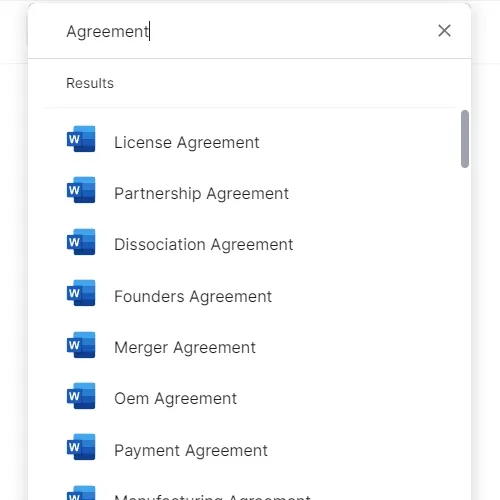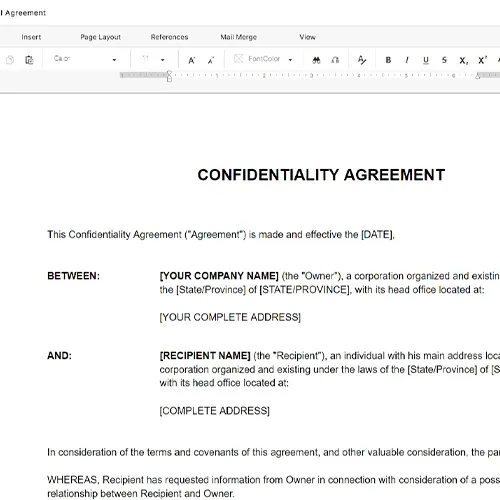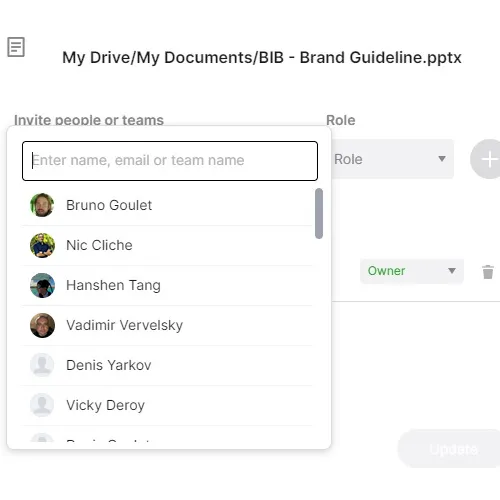Conflict Of Interest Policy For Nonprofit Organizations Template

Document content
This conflict of interest policy for nonprofit organizations template has 4 pages and is a MS Word file type listed under our human resources documents.
Sample of our conflict of interest policy for nonprofit organizations template:
CONFLICT OF INTEREST POLICY FOR NONPROFIT ORGANIZATIONS PURPOSE The purpose of this Conflict of Interest Policy at [YOUR NONPROFIT NAME] is to protect the organization's interests when it is contemplating entering into a transaction or arrangement that might benefit the private interest of an officer or director of the organization or might result in a possible excess benefit transaction. This Policy is intended to supplement but not replace any applicable state and federal laws governing conflict of interest applicable to nonprofit and charitable organizations. CONFLICT OF INTEREST PRINCIPLES Accountability: Ensure that the organization is accountable to its stakeholders by establishing clear procedures for identifying, disclosing, and managing conflicts of interest. Transparency: Maintain transparency in all operations and decision-making processes to prevent any actual, potential, or perceived conflicts of interest. Integrity: Uphold the highest standards of integrity by ensuring that all individuals involved with the organization act in the best interest of the organization and its mission. Fairness: Treat all stakeholders fairly and equitably by implementing measures to manage conflicts of interest and prevent any undue influence or bias. Responsibility: Ensure that the organization meets its ethical obligations and operates in a manner that promotes trust and confidence among stakeholders. DEFINITIONS Interested Person: Any director, principal officer, or member of a committee with governing board-delegated powers who has a direct or indirect financial interest, as defined below, is an interested person. Financial Interest: A person has a financial interest if the person has, directly or indirectly, through business, investment, or family: An ownership or investment interest in any entity with which the organization has a transaction or arrangement, A compensation arrangement with the organization or with any entity or individual with which the organization has a transaction or arrangement, or A potential ownership or investment interest in, or compensation arrangement with, any entity or individual with which the organization is negotiating a transaction or arrangement. Compensation includes direct and indirect remuneration as well as gifts or favors that are not insubstantial. PROCEDURES Duty to Disclose: In connection with any actual or possible conflict of interest, an interested person must disclose the existence of the financial interest and be given the opportunity to disclose all material facts to the directors and members of committees with governing board-delegated powers considering the proposed transaction or arrangement. Determining Whether a Conflict of Interest Exists: After disclosure of the financial interest and all material facts, and after any discussion with the interested person, the disinterested members of the governing board or committee shall decide if a conflict of interest exists. Procedures for Addressing the Conflict of Interest: An interested person may make a presentation at the governing board or committee meeting, but after the presentation, he/she shall leave the meeting during the discussion of, and the vote on, the transaction or arrangement involving the possible conflict of interest. The chairperson of the governing board or committee shall, if appropriate, appoint a disinterested person or committee to investigate alternatives to the proposed transaction or arrangement. After exercising due diligence, the governing board or committee shall determine whether the organization can obtain with reasonable efforts a more advantageous transaction or arrangement from a person or entity that would not give rise to a conflict of interest. If a more advantageous transaction or arrangement is not reasonably attainable under circumstances that would not give rise to a conflict of interest, the governing board or committee shall determine by a majority vote of the disinterested directors whether the transaction or arrangement is in the organization's best interest, for its own benefit, and whether it is fair and reasonable
3,000+ Templates & Tools to Help You Start, Run & Grow Your Business

Document content
This conflict of interest policy for nonprofit organizations template has 4 pages and is a MS Word file type listed under our human resources documents.
Sample of our conflict of interest policy for nonprofit organizations template:
CONFLICT OF INTEREST POLICY FOR NONPROFIT ORGANIZATIONS PURPOSE The purpose of this Conflict of Interest Policy at [YOUR NONPROFIT NAME] is to protect the organization's interests when it is contemplating entering into a transaction or arrangement that might benefit the private interest of an officer or director of the organization or might result in a possible excess benefit transaction. This Policy is intended to supplement but not replace any applicable state and federal laws governing conflict of interest applicable to nonprofit and charitable organizations. CONFLICT OF INTEREST PRINCIPLES Accountability: Ensure that the organization is accountable to its stakeholders by establishing clear procedures for identifying, disclosing, and managing conflicts of interest. Transparency: Maintain transparency in all operations and decision-making processes to prevent any actual, potential, or perceived conflicts of interest. Integrity: Uphold the highest standards of integrity by ensuring that all individuals involved with the organization act in the best interest of the organization and its mission. Fairness: Treat all stakeholders fairly and equitably by implementing measures to manage conflicts of interest and prevent any undue influence or bias. Responsibility: Ensure that the organization meets its ethical obligations and operates in a manner that promotes trust and confidence among stakeholders. DEFINITIONS Interested Person: Any director, principal officer, or member of a committee with governing board-delegated powers who has a direct or indirect financial interest, as defined below, is an interested person. Financial Interest: A person has a financial interest if the person has, directly or indirectly, through business, investment, or family: An ownership or investment interest in any entity with which the organization has a transaction or arrangement, A compensation arrangement with the organization or with any entity or individual with which the organization has a transaction or arrangement, or A potential ownership or investment interest in, or compensation arrangement with, any entity or individual with which the organization is negotiating a transaction or arrangement. Compensation includes direct and indirect remuneration as well as gifts or favors that are not insubstantial. PROCEDURES Duty to Disclose: In connection with any actual or possible conflict of interest, an interested person must disclose the existence of the financial interest and be given the opportunity to disclose all material facts to the directors and members of committees with governing board-delegated powers considering the proposed transaction or arrangement. Determining Whether a Conflict of Interest Exists: After disclosure of the financial interest and all material facts, and after any discussion with the interested person, the disinterested members of the governing board or committee shall decide if a conflict of interest exists. Procedures for Addressing the Conflict of Interest: An interested person may make a presentation at the governing board or committee meeting, but after the presentation, he/she shall leave the meeting during the discussion of, and the vote on, the transaction or arrangement involving the possible conflict of interest. The chairperson of the governing board or committee shall, if appropriate, appoint a disinterested person or committee to investigate alternatives to the proposed transaction or arrangement. After exercising due diligence, the governing board or committee shall determine whether the organization can obtain with reasonable efforts a more advantageous transaction or arrangement from a person or entity that would not give rise to a conflict of interest. If a more advantageous transaction or arrangement is not reasonably attainable under circumstances that would not give rise to a conflict of interest, the governing board or committee shall determine by a majority vote of the disinterested directors whether the transaction or arrangement is in the organization's best interest, for its own benefit, and whether it is fair and reasonable
Easily Create Any Business Document You Need in Minutes.

Access over 3,000+ business and legal templates for any business task, project or initiative.

Customize your ready-made business document template and save it in the cloud.

Share your files and folders with your team. Create a space of seamless collaboration.
Templates and Tools to Manage Every Aspect of Your Business.
Business in a Box Covers Every Business Department
Includes 16 Types of Business Documents You Need
and Achieve Your Business Goals Faster.
